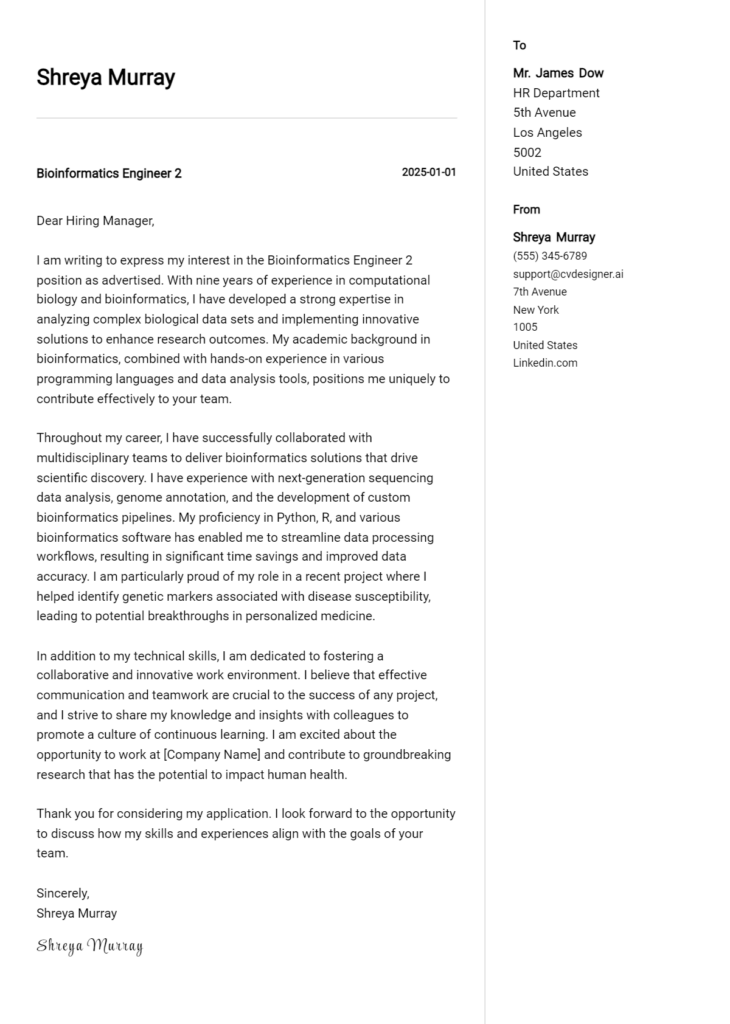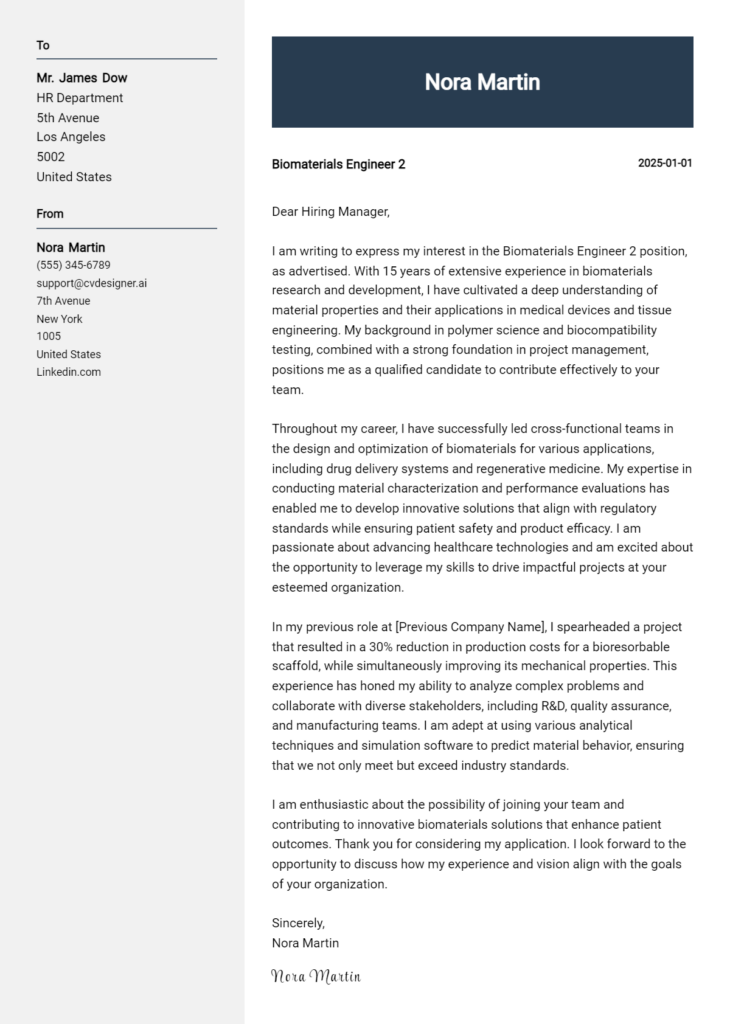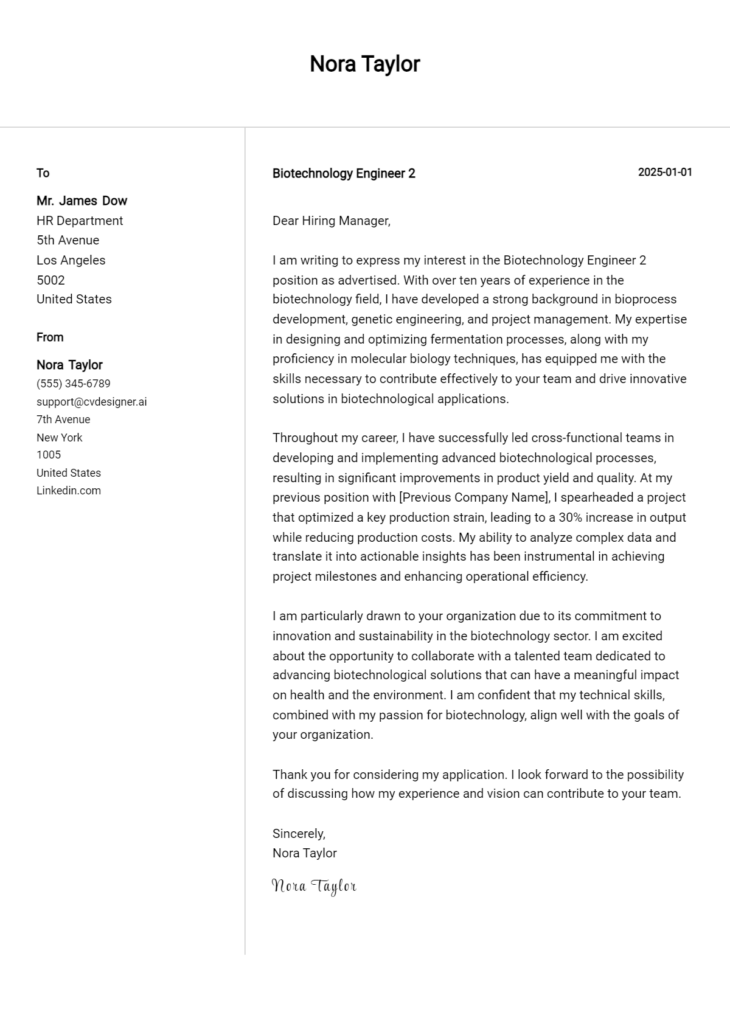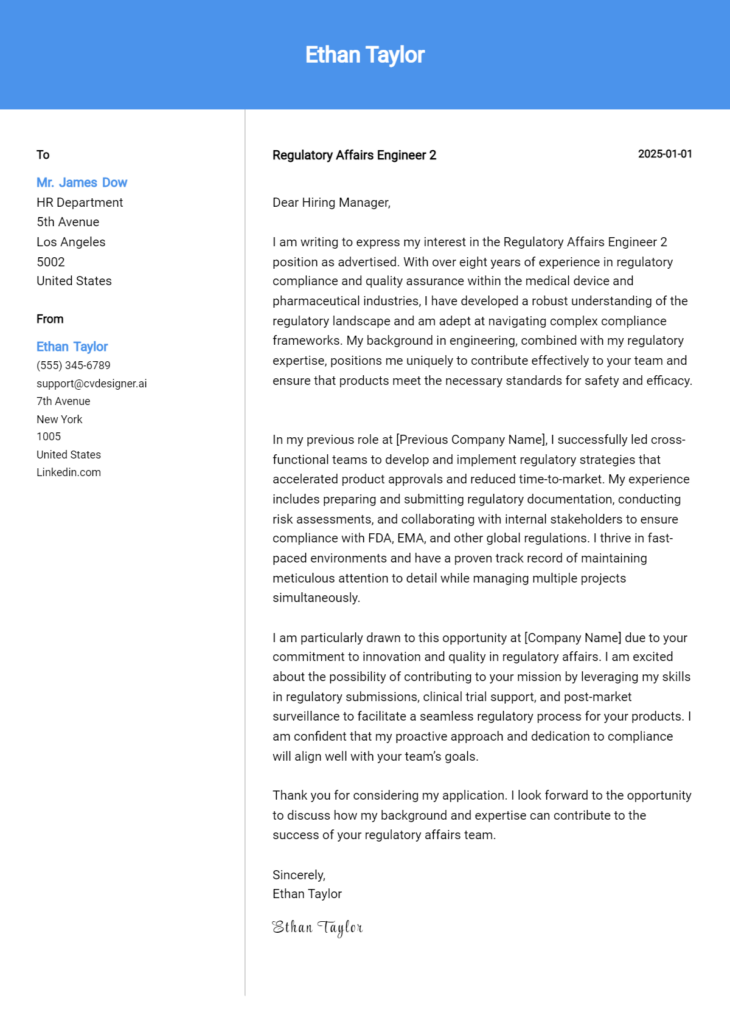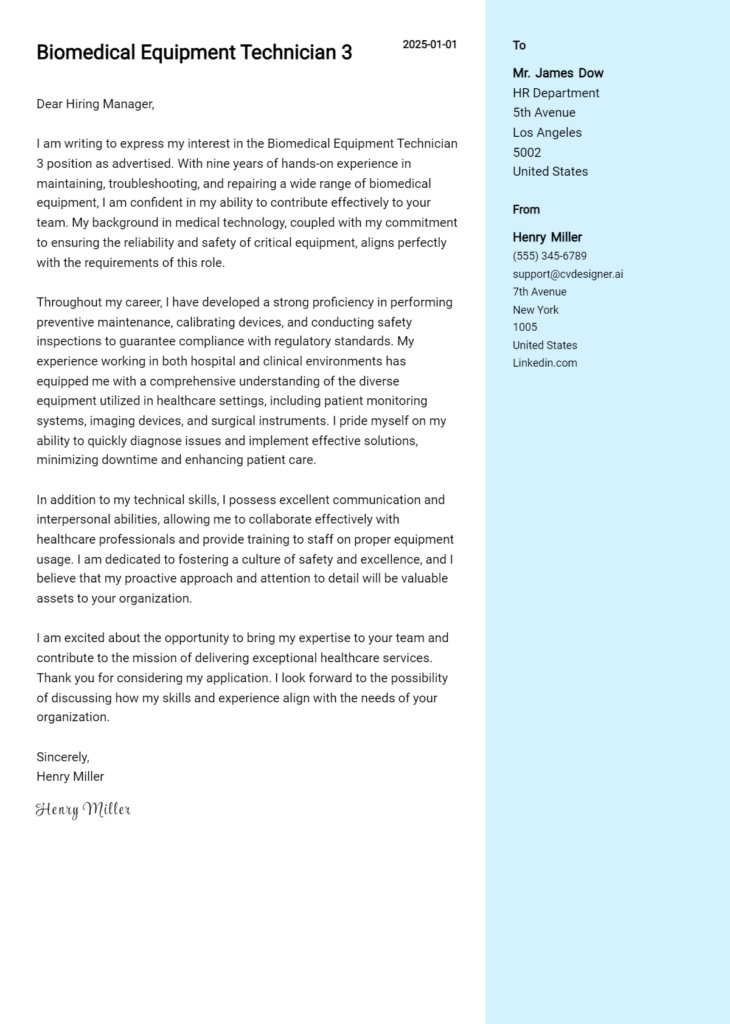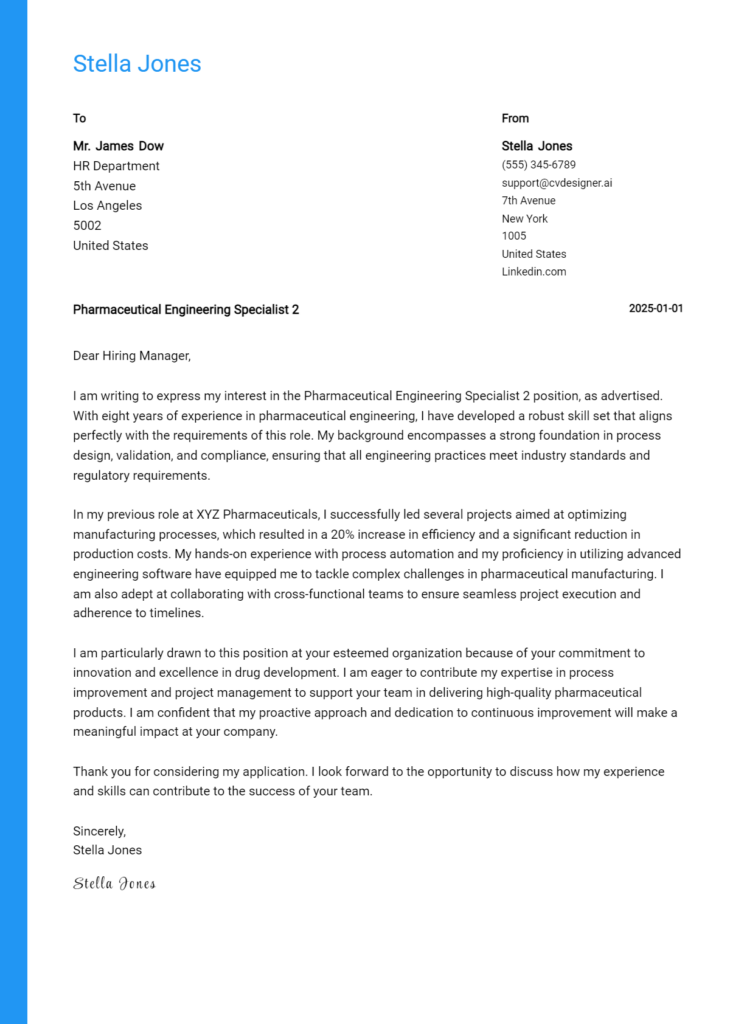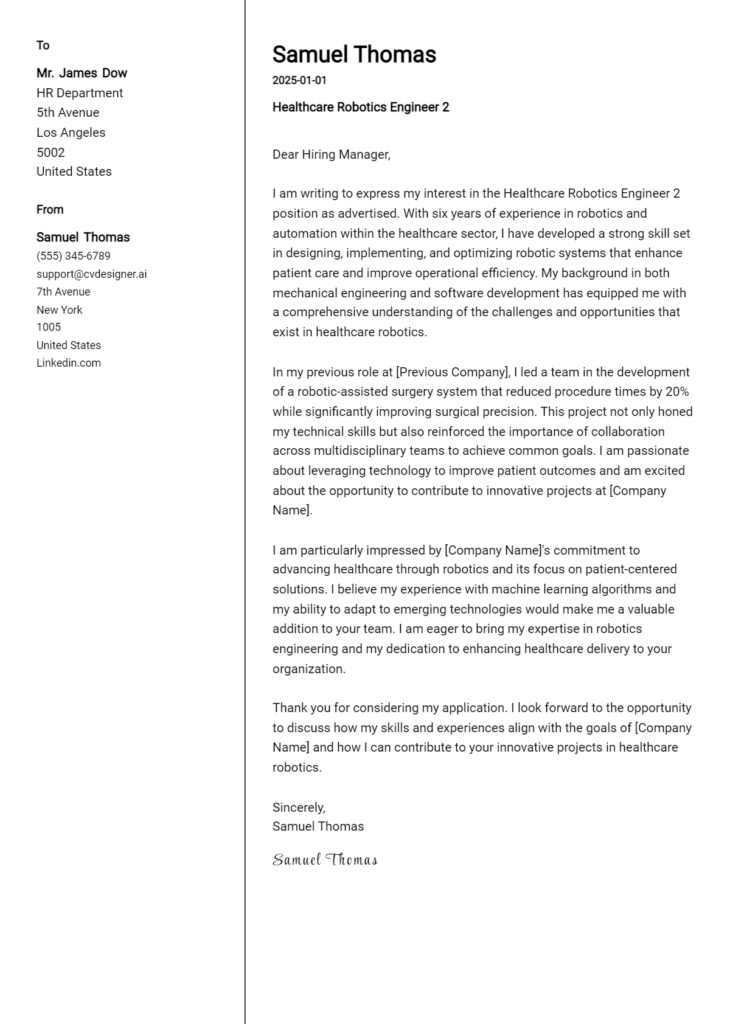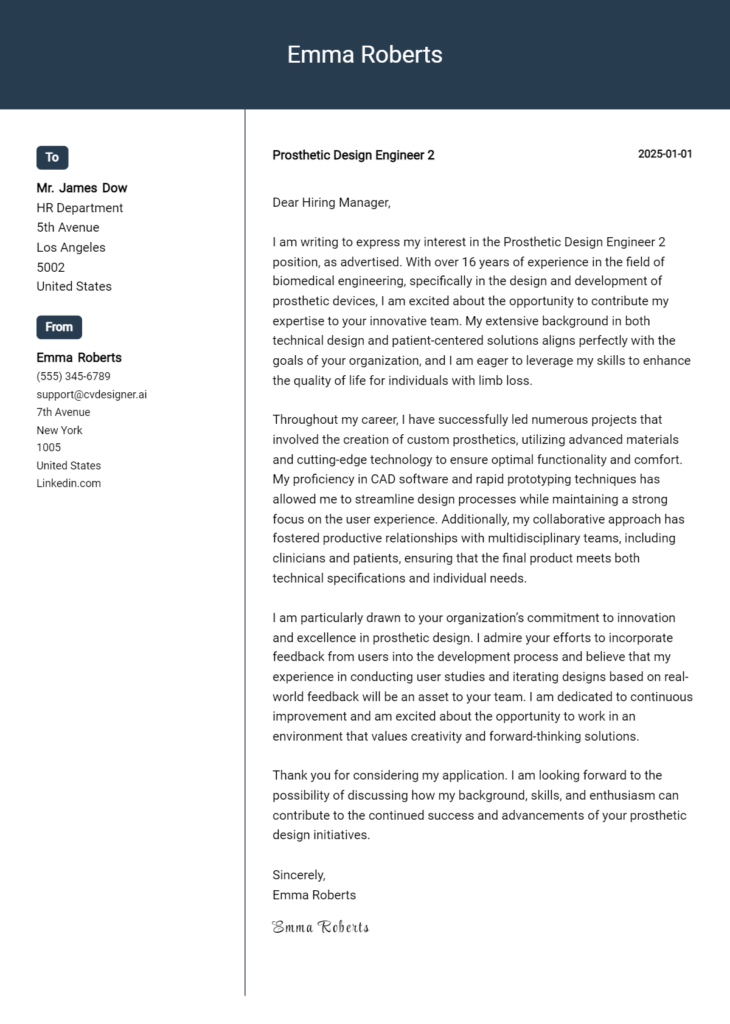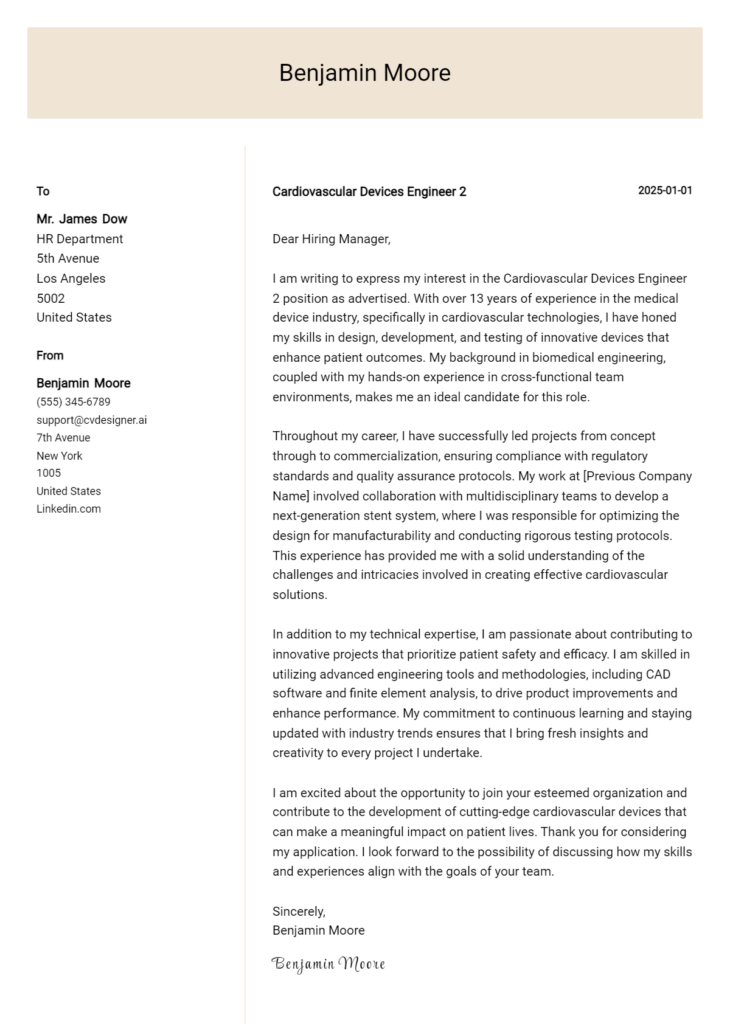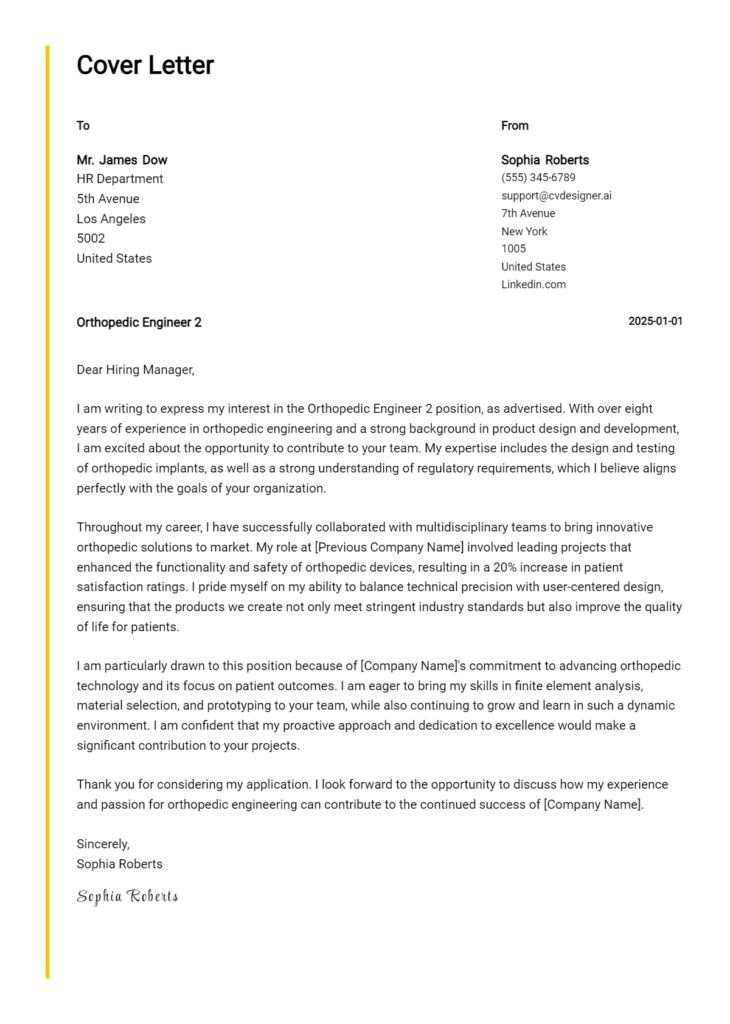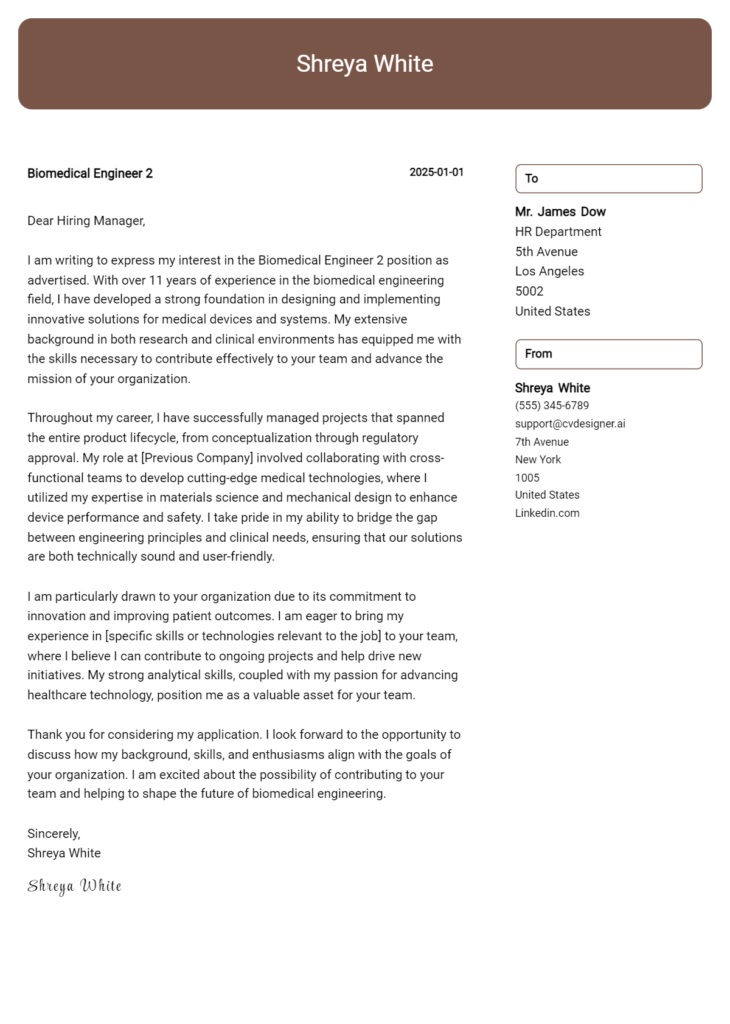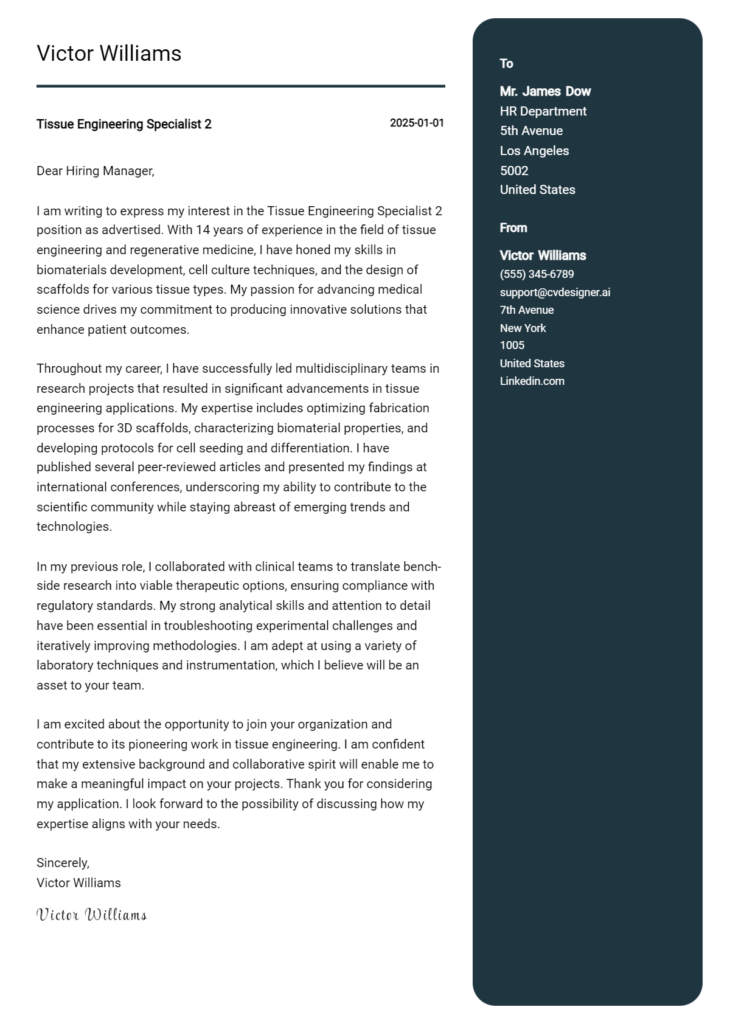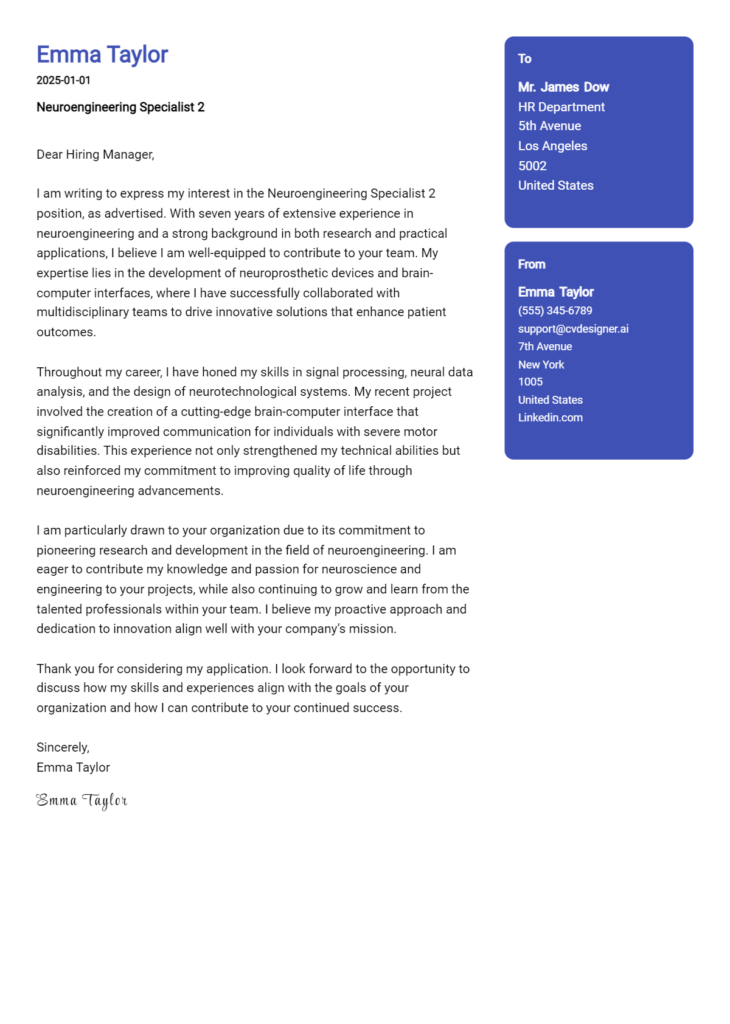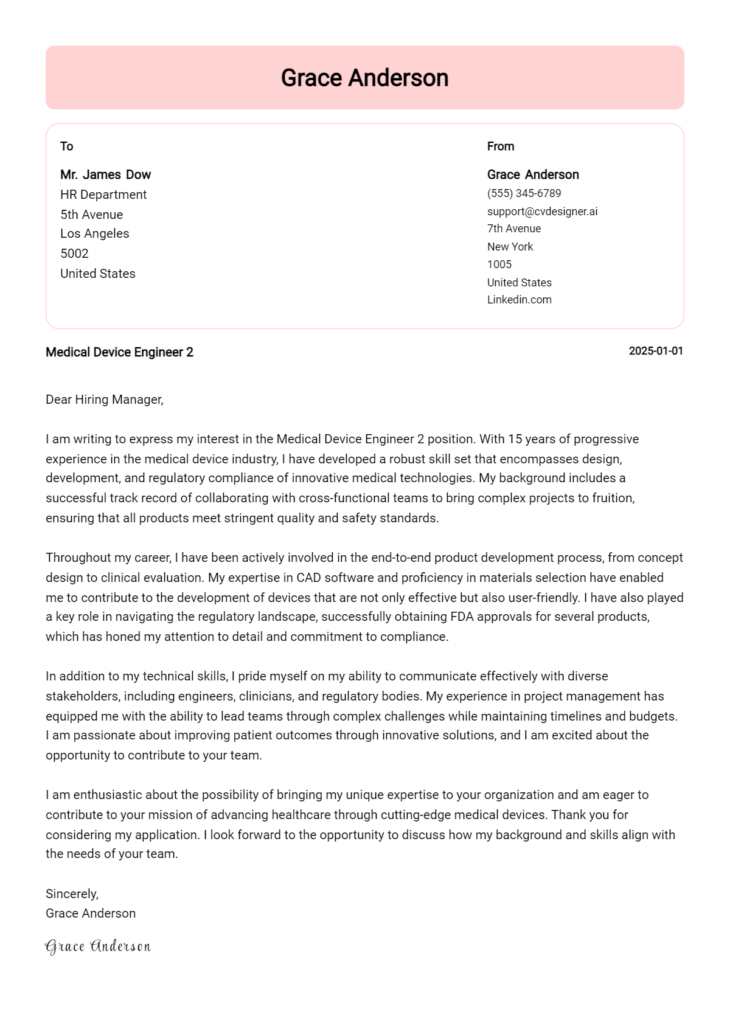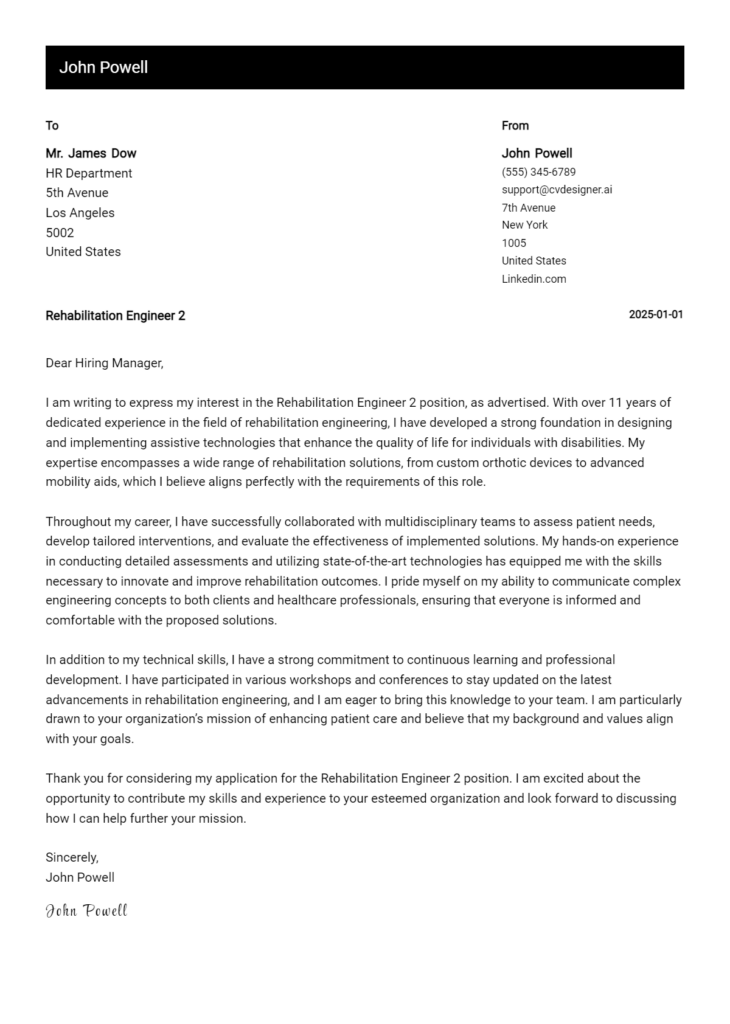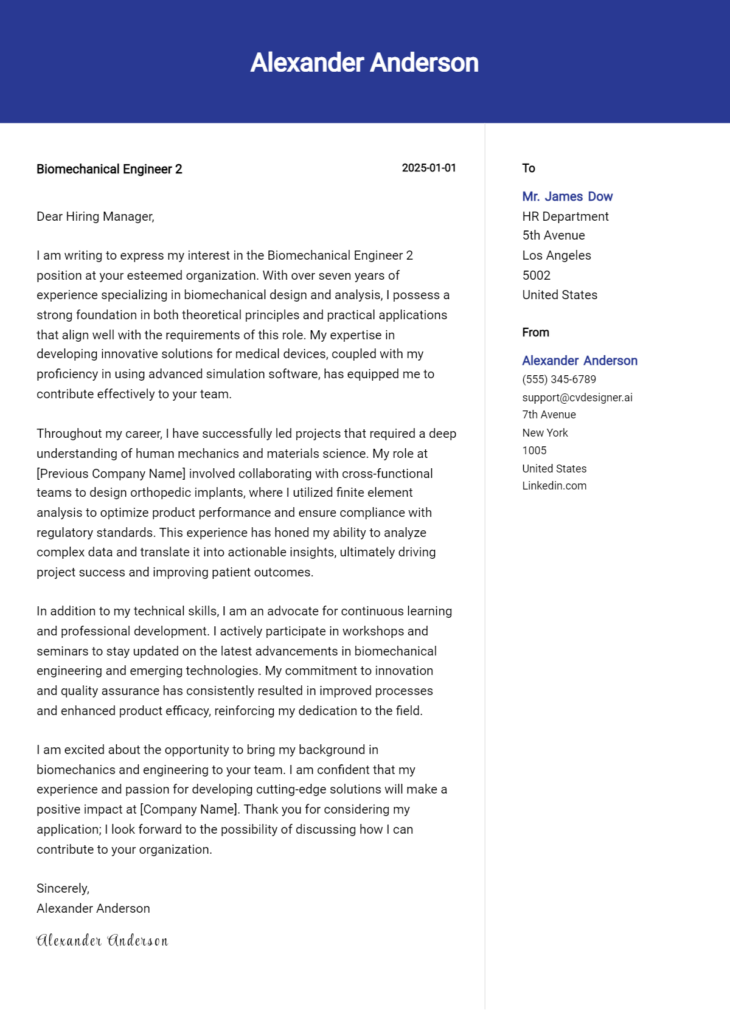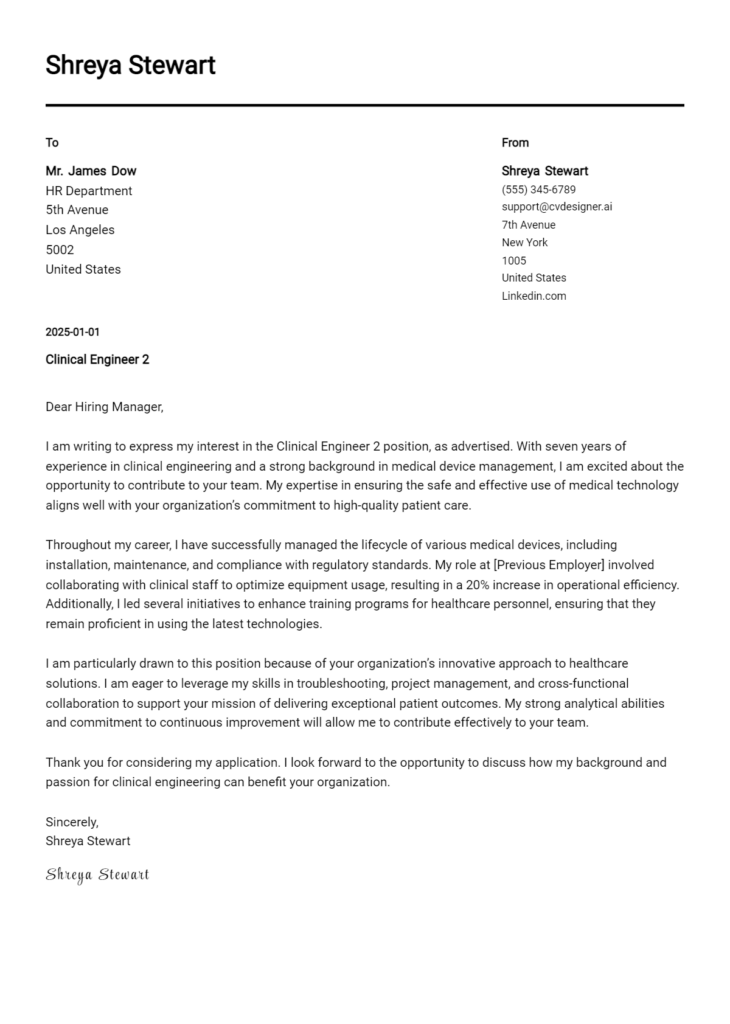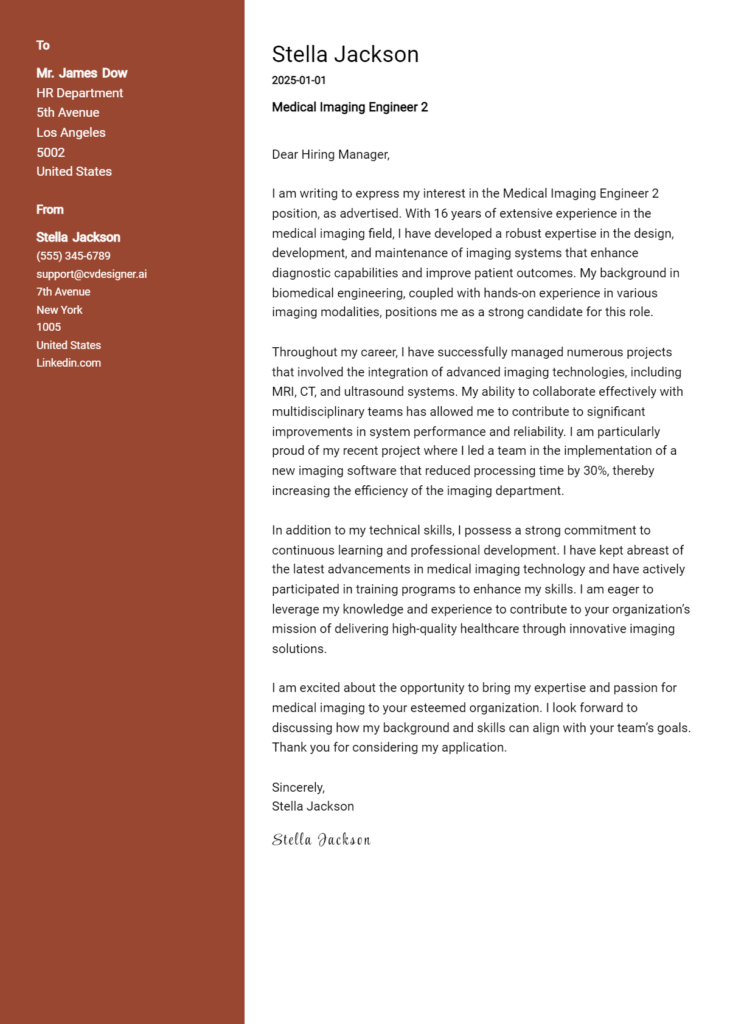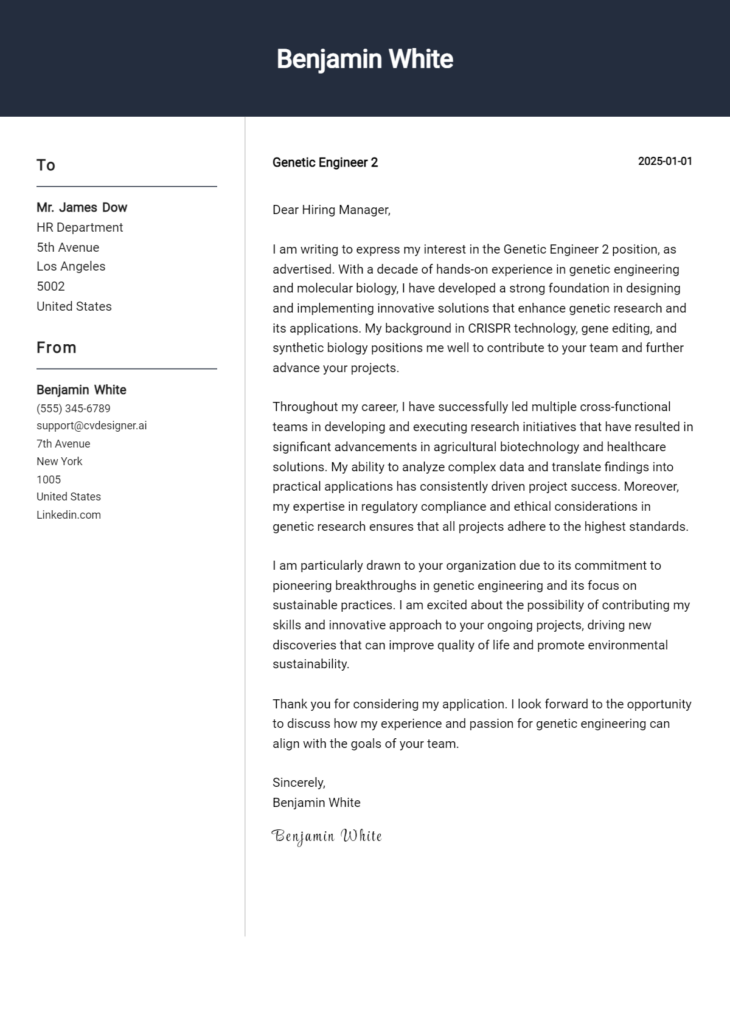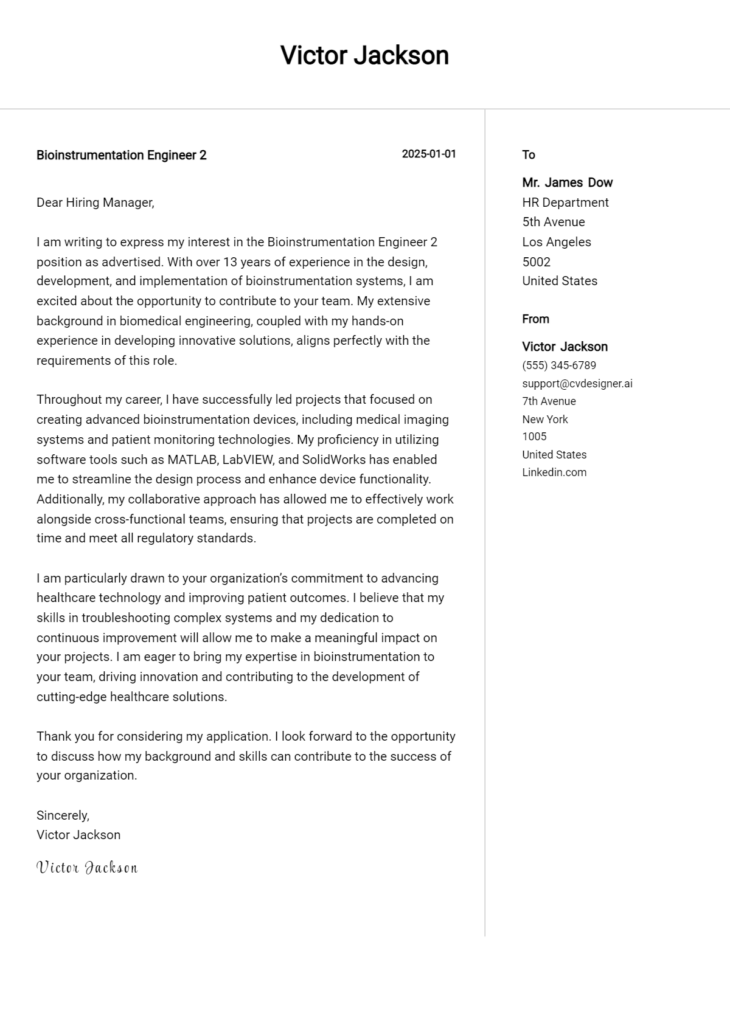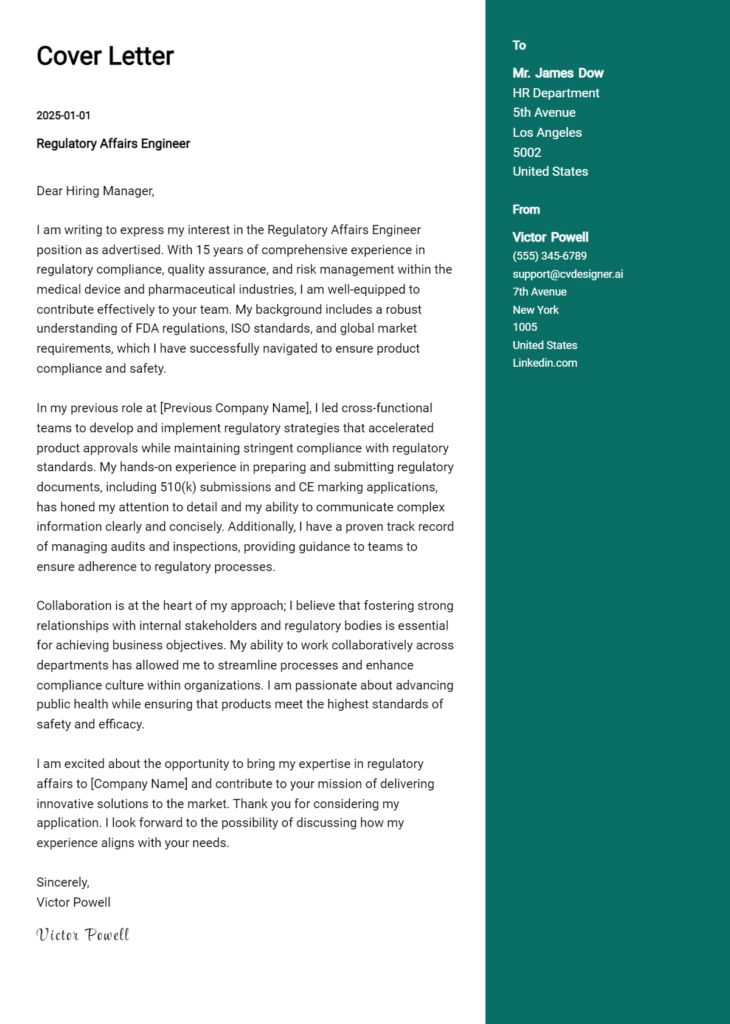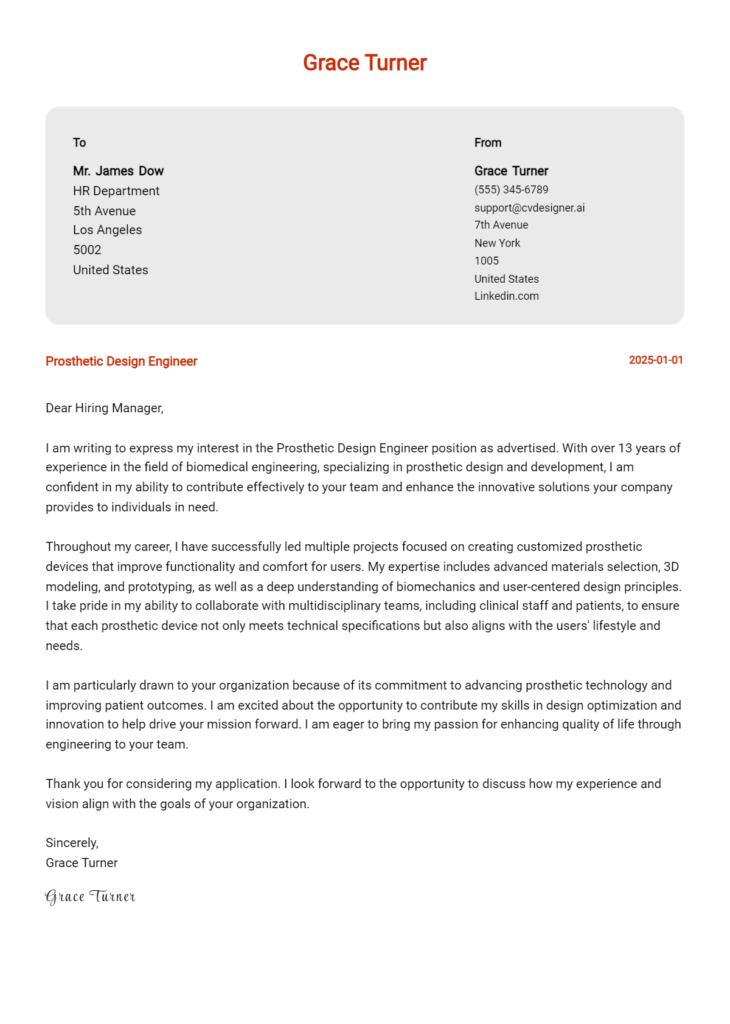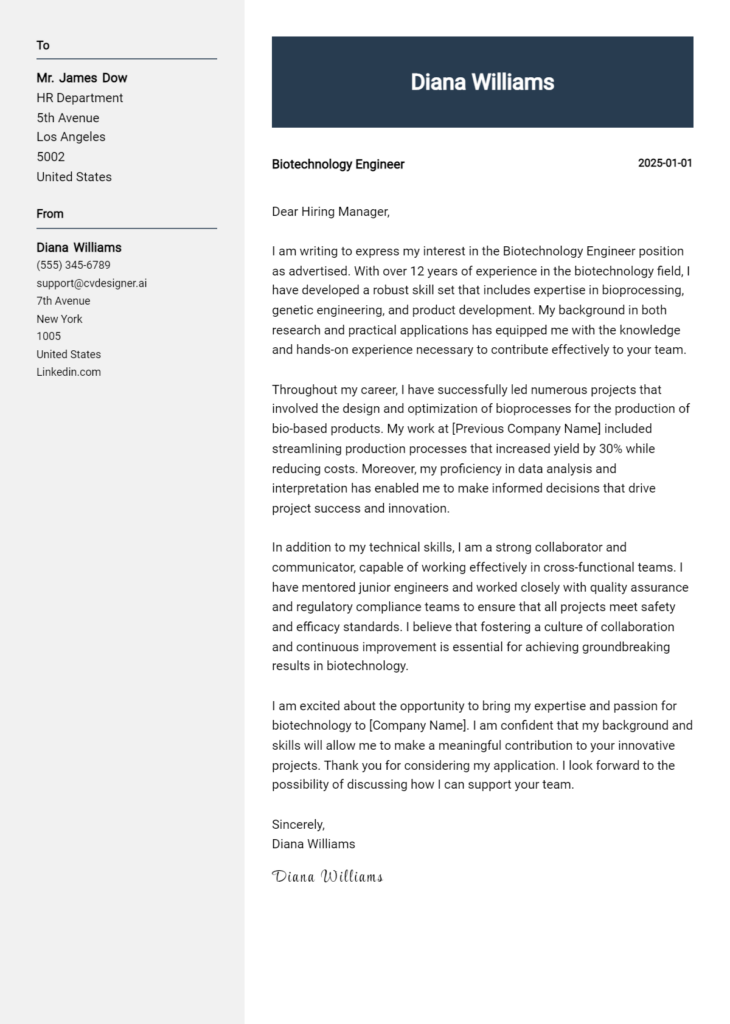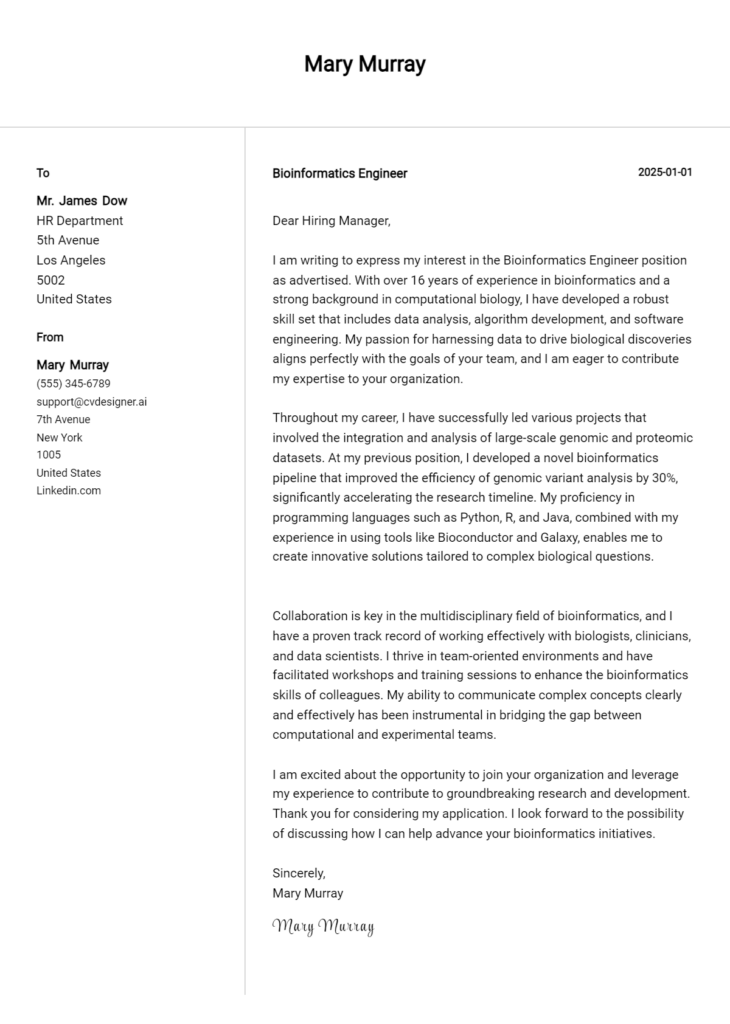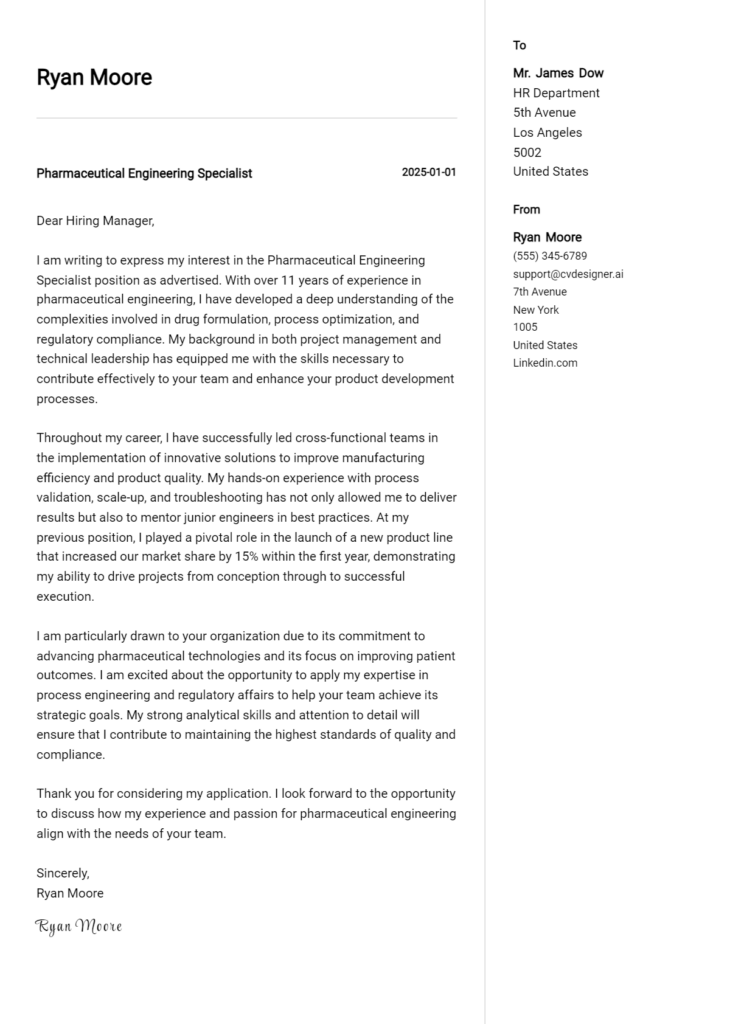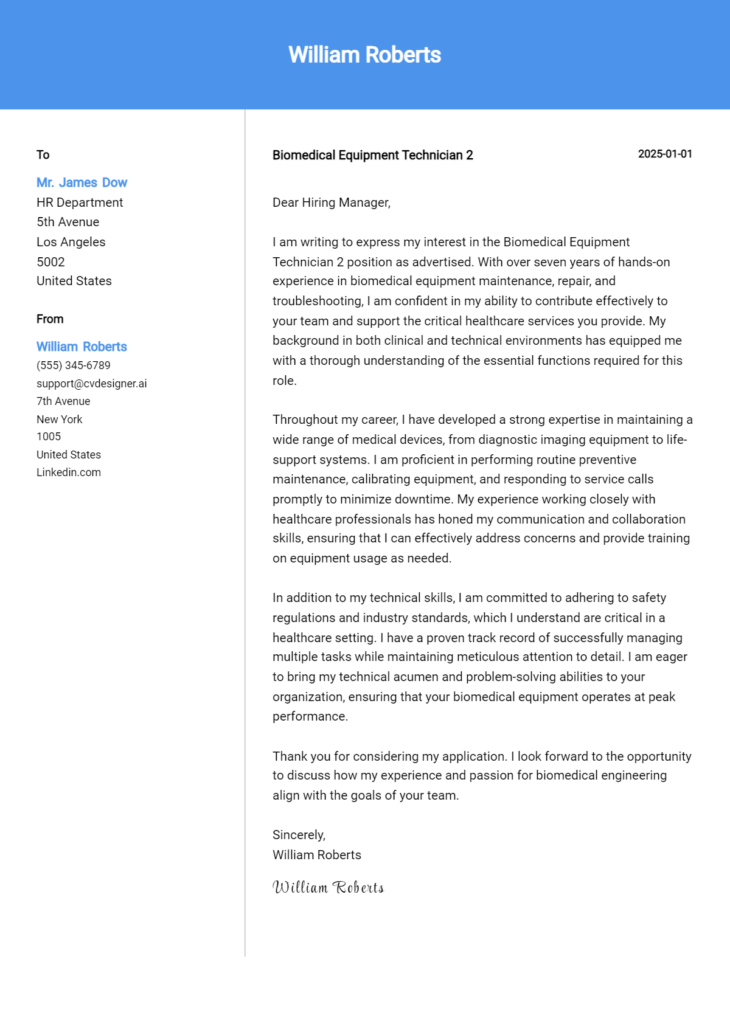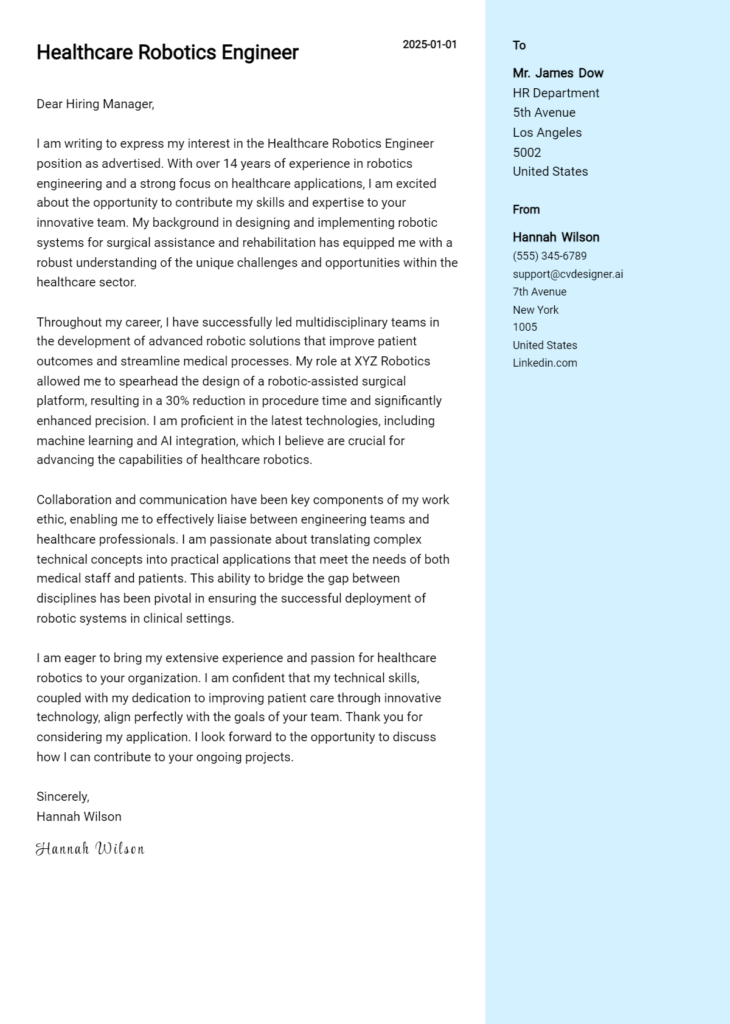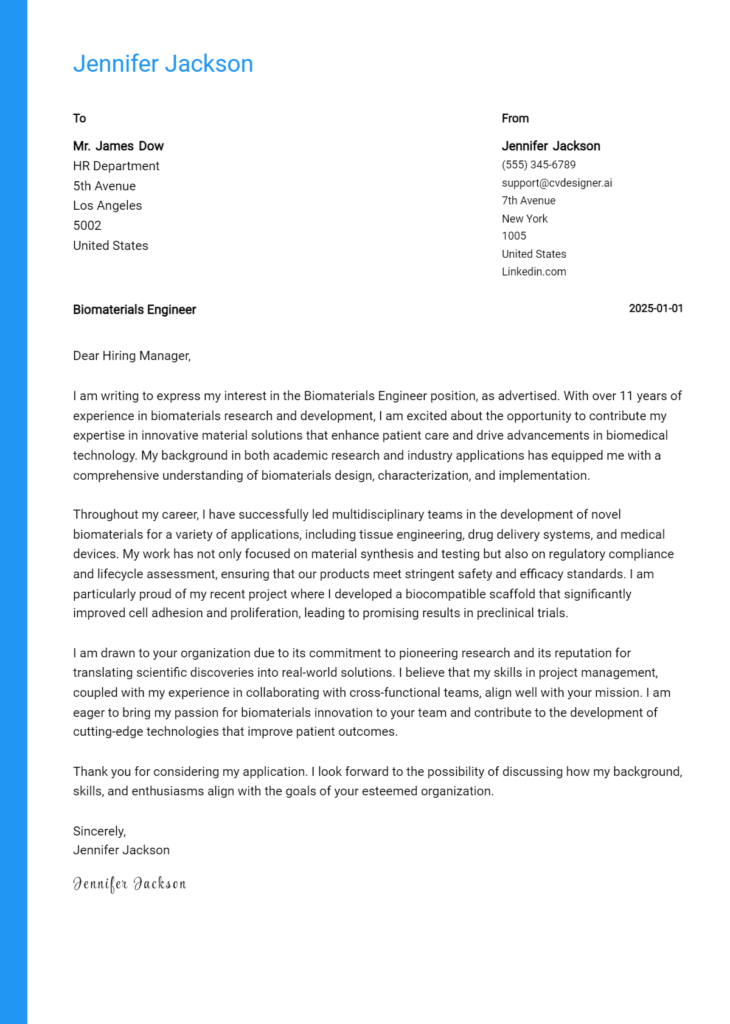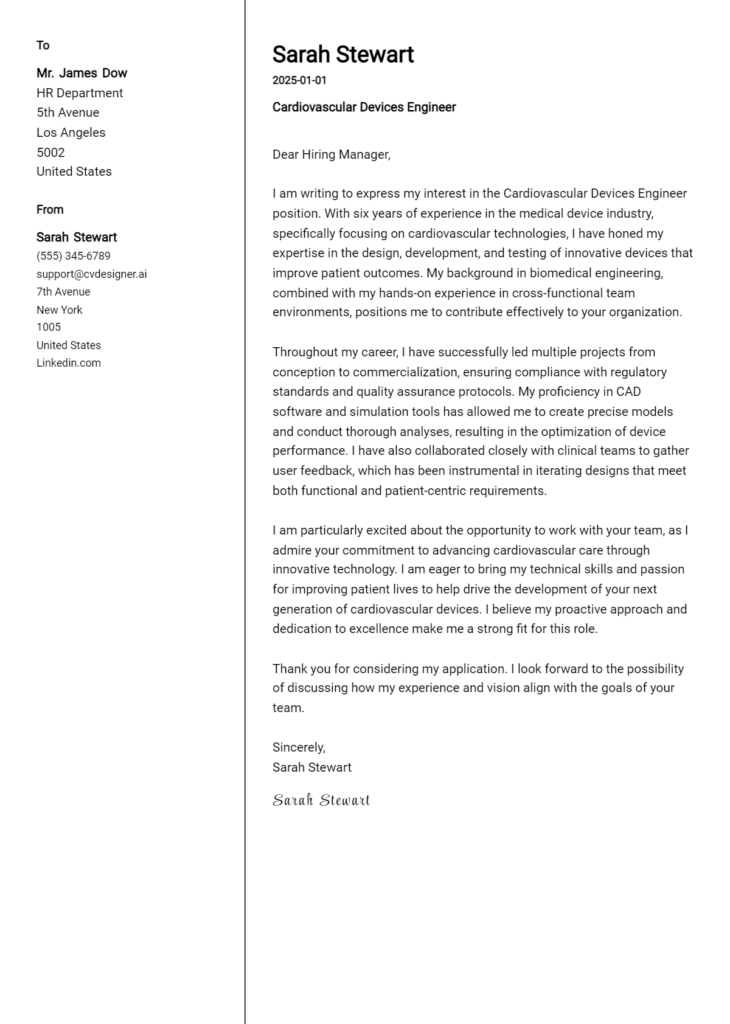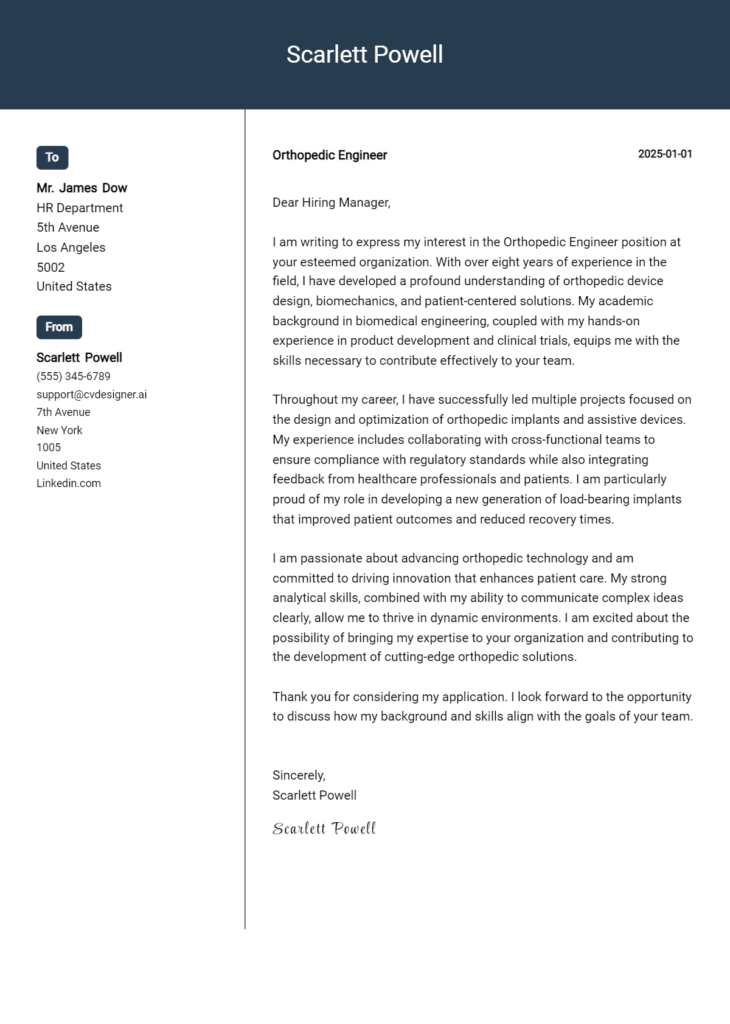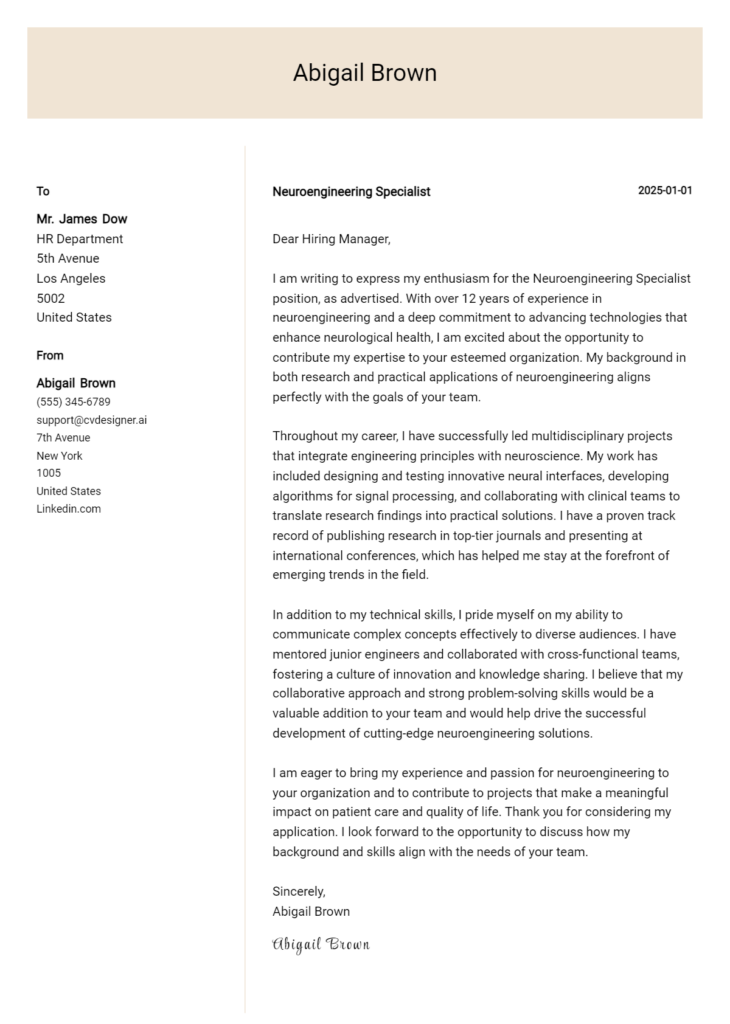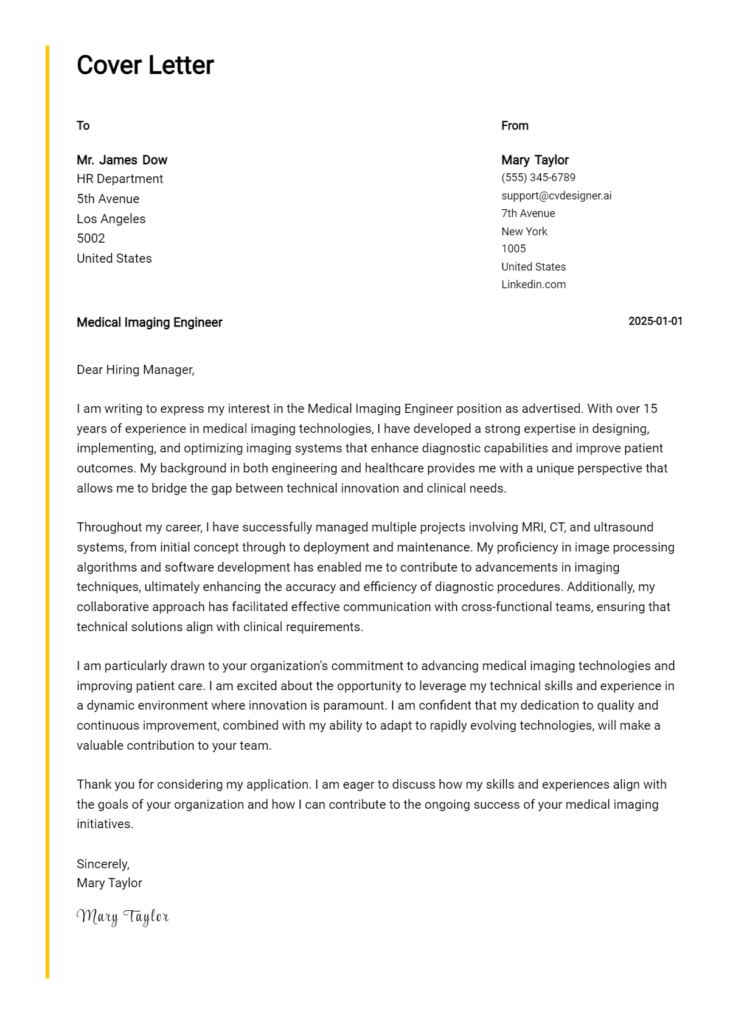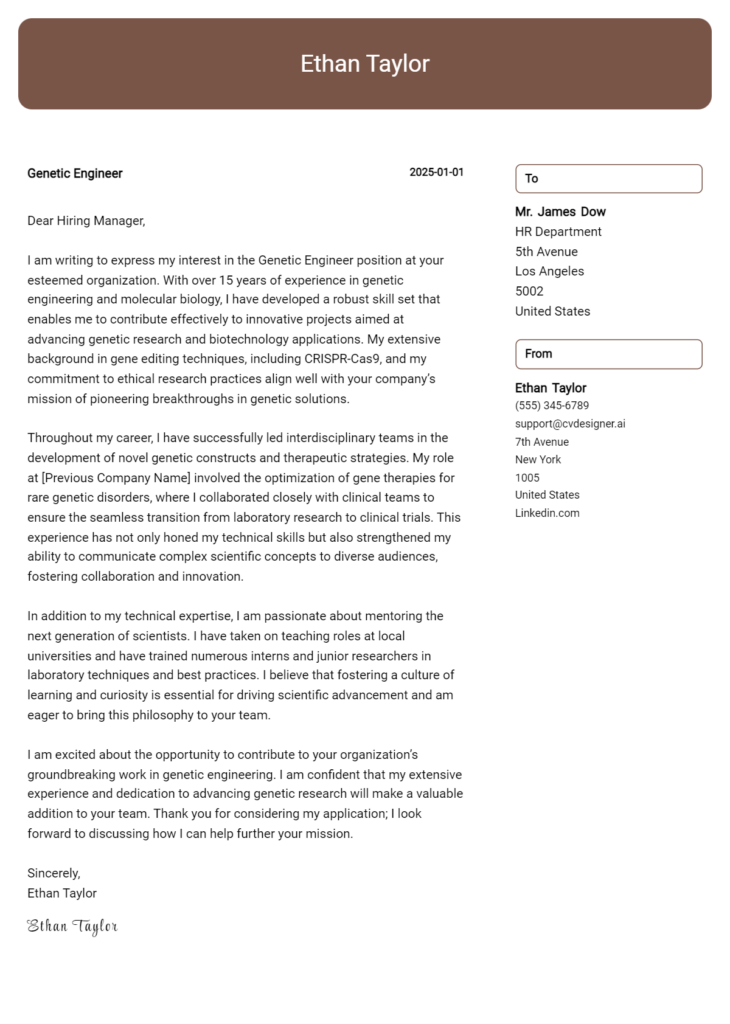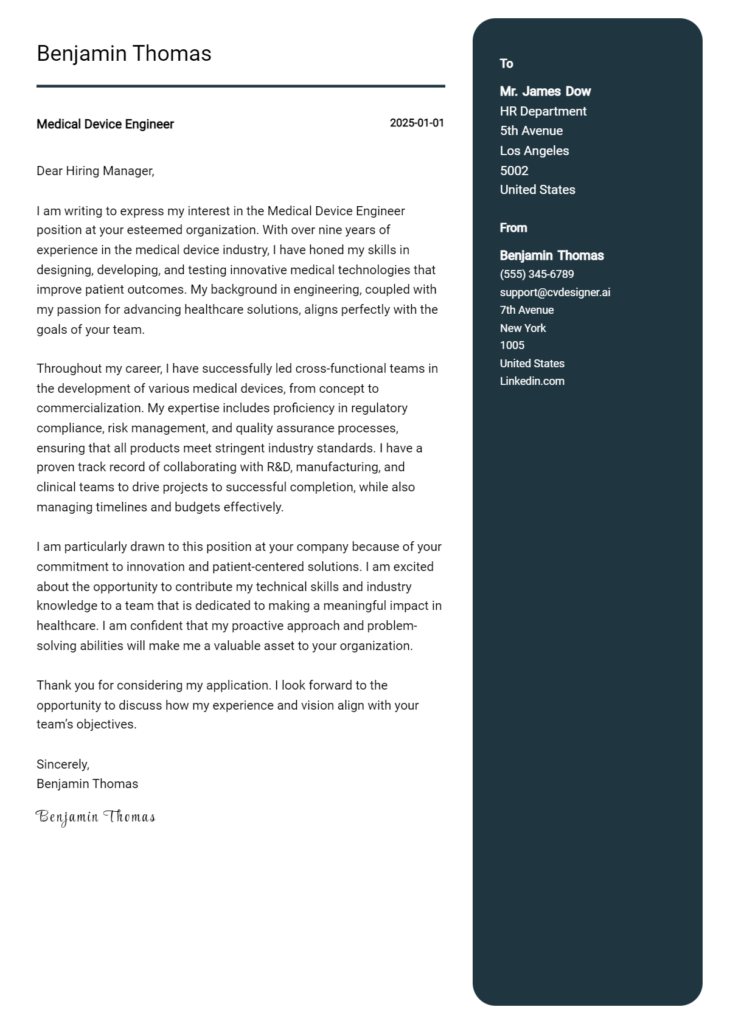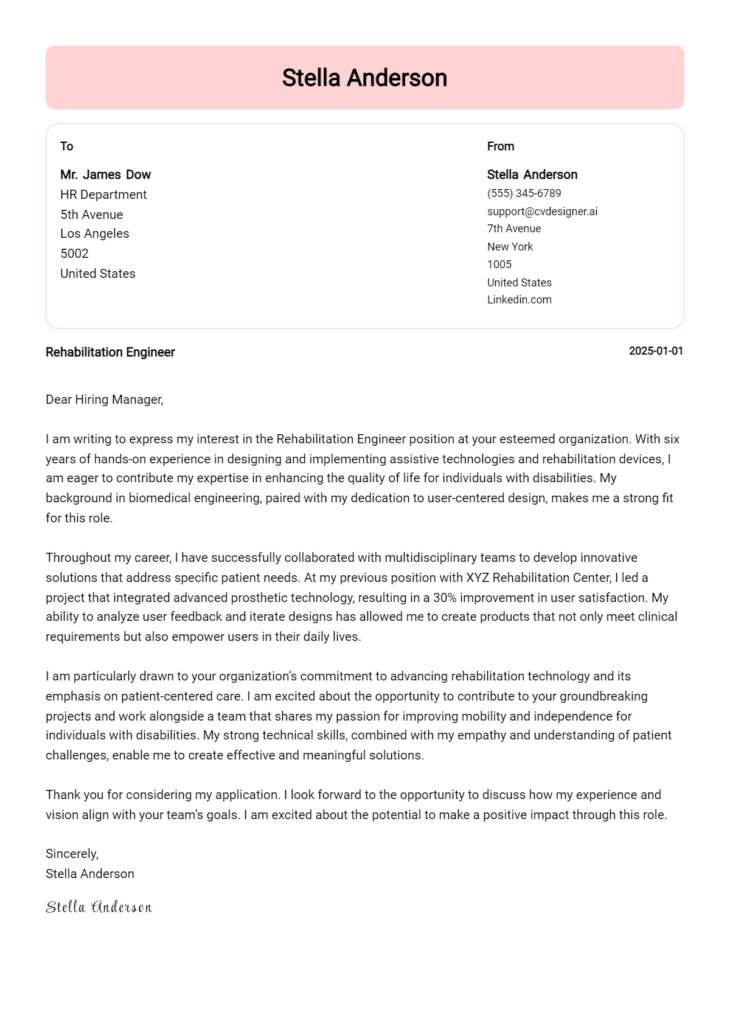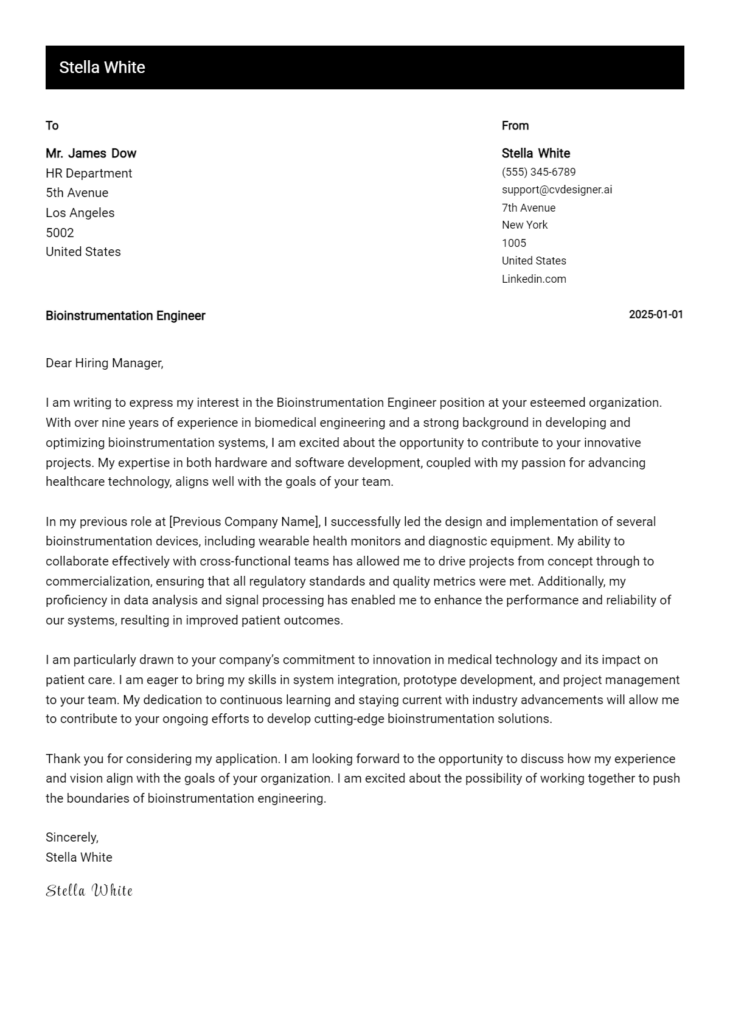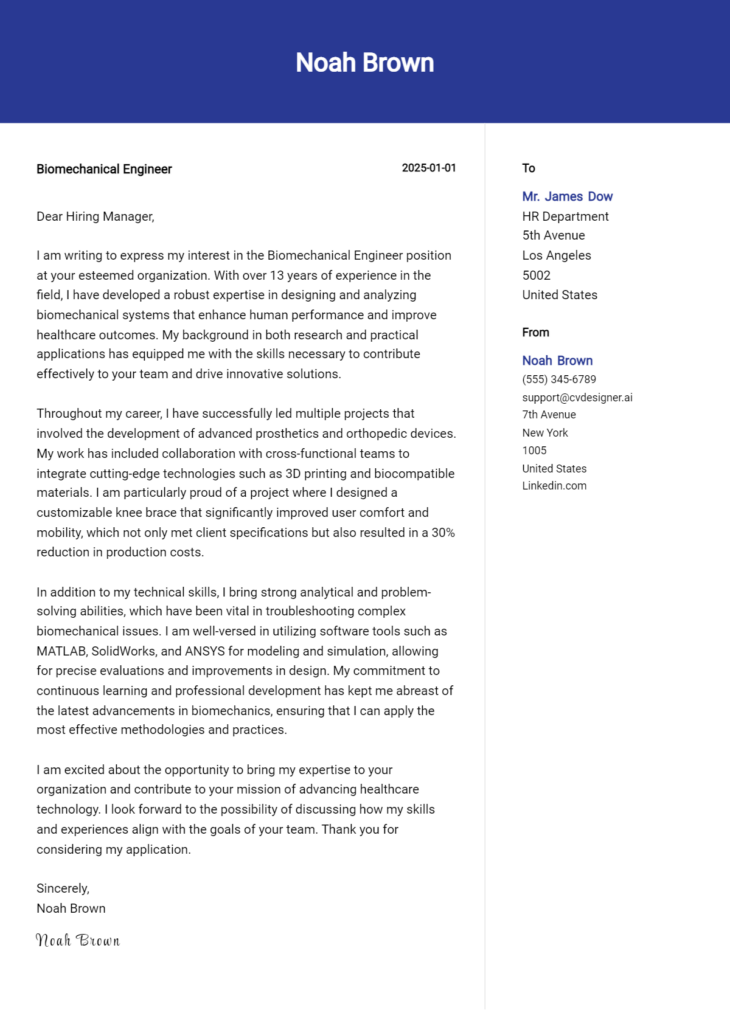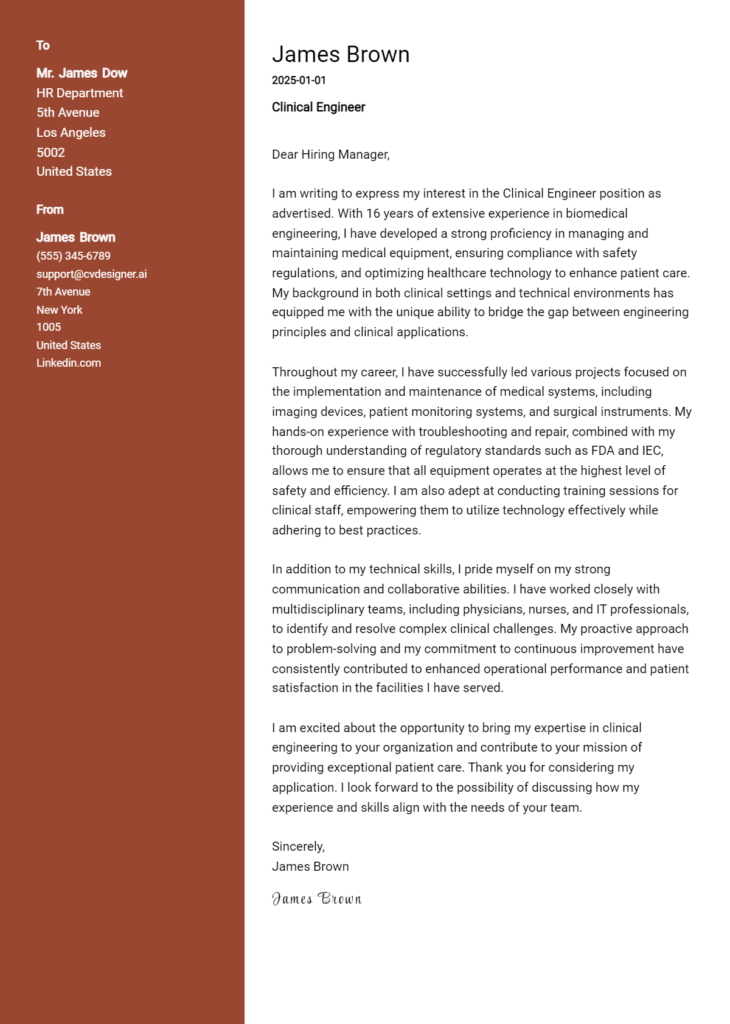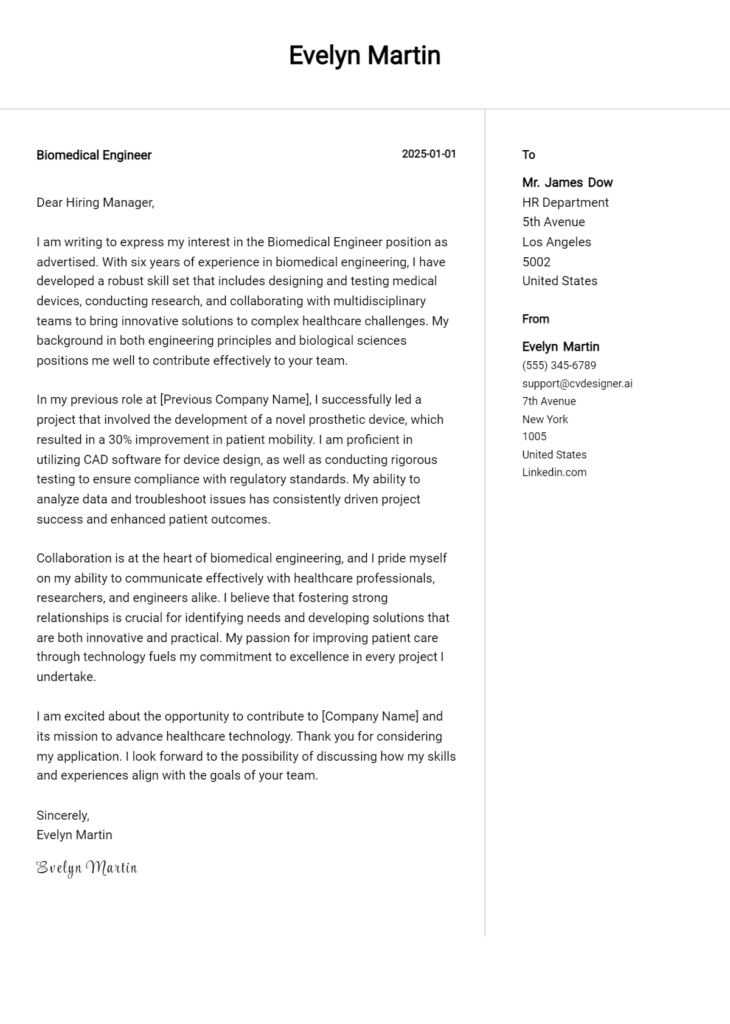Tissue Engineering Specialist Cover Letter Examples
Explore additional Tissue Engineering Specialist cover letter samples and guides and see what works for your level of experience or role.
How to Format a Tissue Engineering Specialist Cover Letter?
Crafting a compelling cover letter is essential for a Tissue Engineering Specialist, as it serves as your first opportunity to demonstrate your expertise and passion for the field. The format you choose reflects your scientific acumen and attention to detail—qualities that are critical in the precision-driven world of tissue engineering. A well-structured cover letter not only grabs the hiring manager's attention but also effectively communicates your unique qualifications and experiences relevant to the role.
In this guide, we will outline how to structure your cover letter, providing insights and examples tailored to the tissue engineering field.
We'll focus on the essential components of a professional cover letter, including:
- Cover Letter Header
- Cover Letter Greeting
- Cover Letter Introduction
- Cover Letter Body
- Cover Letter Closing
Each section is crucial in showcasing your qualifications and professionalism. Let’s break down each part and explain how to make your tissue engineering cover letter stand out.
Importance of the Cover Letter Header for a Tissue Engineering Specialist
The cover letter header is a critical component of your application as a Tissue Engineering Specialist because it sets the tone for your professionalism and attention to detail. A well-structured header provides essential information, including your contact details, the date, and the recipient's information, ensuring that your letter is easy to read and locate. Clarity and professionalism in this section not only reflect your organizational skills but also make a strong first impression.
A strong header conveys confidence and readiness, while a weak one may suggest carelessness. Here are examples to illustrate the difference:
Strong Example
Jane Doe 123 Bioengineering Lane Innovation City, ST 12345 jane.doe@email.com (123) 456-7890 October 5, 2023 Dr. John Smith Hiring Manager Biomedical Solutions Inc. 456 Research Park Innovation City, ST 12345
Weak Example
Jane D 123 Lane Some City jane@e.com 5/10/23 Manager Company Name Address
The Importance of a Personalized Greeting in Your Cover Letter
The greeting of your cover letter is crucial as it sets the tone for the rest of your application. A well-crafted greeting not only demonstrates your professionalism but also shows that you have taken the time to personalize your letter for the specific role and organization. Addressing the hiring manager directly can create a sense of connection and indicates your genuine interest in the position. To avoid generic greetings, it’s advisable to conduct a bit of research to find the name of the hiring manager or the person responsible for the recruitment process. This small effort can significantly enhance your letter's impact.
Strong Greeting Example
Dear Dr. Jane Smith,
Weak Greeting Example
To Whom It May Concern,
Importance of a Well-Crafted Cover Letter Introduction for a Tissue Engineering Specialist
A well-crafted cover letter introduction is crucial in making a strong first impression on hiring managers, especially for specialized roles like a Tissue Engineering Specialist. This introduction should not only capture attention but also convey genuine interest in the position. It is an opportunity to highlight key skills or notable achievements that align with the job requirements, setting the tone for the rest of the letter. An engaging introduction can differentiate a candidate from others, making it essential to invest time and effort in crafting a compelling opening.
Strong Example
Dear [Hiring Manager's Name], I am excited to apply for the Tissue Engineering Specialist position at [Company Name], as I have been following your groundbreaking work in regenerative medicine for years. With a Ph.D. in Biomedical Engineering and over five years of hands-on experience in developing scaffold materials for tissue regeneration, I am eager to contribute my expertise in biocompatibility and material synthesis to your innovative team. My recent project on 3D-printed vascular tissues, which was published in [Journal Name], exemplifies my dedication to advancing the field and my ability to produce results that align with your company's mission.
Weak Example
To Whom It May Concern, I am writing to apply for the Tissue Engineering Specialist position. I have some experience in the field and think I would be a good fit. I have worked in labs before and have a degree in a related area. I am looking for a job and would like to be considered for this one.
Purpose of the Cover Letter Body for a Tissue Engineering Specialist
The cover letter body for a Tissue Engineering Specialist serves as a crucial platform for candidates to effectively showcase their skills, experiences, and the unique value they bring to a prospective employer. This section allows the candidate to articulate specific projects or accomplishments that demonstrate their expertise in tissue regeneration, biomaterials, and cellular therapies. By highlighting relevant experiences, such as successful collaborations on research studies or innovative contributions to product development, candidates can create a compelling narrative that aligns their capabilities with the needs of the company. A well-crafted cover letter body not only reflects the candidate’s technical proficiency but also their passion for advancing the field of tissue engineering.
Strong Example
Dear [Hiring Manager's Name], I am excited to apply for the Tissue Engineering Specialist position at [Company Name]. In my previous role at [Previous Company], I led a groundbreaking project focused on developing a novel scaffold for cartilage regeneration, which resulted in a 30% improvement in tissue integration compared to existing solutions. My expertise in 3D bioprinting and my collaborative work with interdisciplinary teams have equipped me with the skills necessary to contribute effectively to your innovative projects at [Company Name]. Additionally, my published research on stem cell differentiation into chondrocytes underscores my commitment to advancing tissue engineering techniques. I am eager to bring my strong background in biomaterials and passion for regenerative medicine to your esteemed team. Sincerely, [Your Name]
Weak Example
Dear [Hiring Manager's Name], I am applying for the Tissue Engineering Specialist position. I have a degree in biomedical engineering and have worked in various labs. I think I would be a good fit for your company. I have done some projects related to tissue engineering, but I don’t have specific examples to share. I am excited about the opportunity to work at [Company Name]. Best, [Your Name]
Importance of the Cover Letter Closing for a Tissue Engineering Specialist
The closing paragraph of your cover letter is crucial as it serves to summarize your qualifications, reiterate your enthusiasm for the Tissue Engineering Specialist role, and encourage the hiring manager to take the next steps, such as reviewing your resume or scheduling an interview. A strong closing can leave a lasting impression, demonstrating your professionalism and commitment to the position, while a weak closing may fail to convey your passion or could even detract from your overall message.
Strong Example
Thank you for considering my application for the Tissue Engineering Specialist position. With my extensive background in biomaterials and regenerative medicine, coupled with my passion for advancing tissue engineering technologies, I am eager to contribute to your innovative team. I look forward to the opportunity to discuss how my skills align with your goals and how I can support the important work your organization is doing. Please feel free to contact me to schedule an interview at your earliest convenience. Thank you once again for your time and consideration.
Weak Example
I hope you look at my resume. I want this job. Let me know if you want to talk.
Crafting an effective cover letter is essential for candidates aspiring to become a Tissue Engineering Specialist. This specialized role requires not only a solid understanding of tissue engineering principles but also the ability to convey one’s technical skills, problem-solving capabilities, and collaborative spirit. Additionally, demonstrating knowledge of the Software Development Life Cycle (SDLC) and a commitment to continuous learning can set you apart from other applicants. The following tips will help you highlight these critical areas in your cover letter and make a strong impression on potential employers.
Tips for Writing a Cover Letter as a Tissue Engineering Specialist
Showcase Your Technical Skills
Clearly outline your technical expertise relevant to tissue engineering. Mention specific technologies, methodologies, or tools you have experience with, such as 3D bioprinting, biomaterials development, or stem cell research. Use quantifiable achievements to demonstrate your proficiency and impact in previous roles.Highlight Problem-Solving Abilities
Provide examples of past challenges you faced in research or project settings and how you approached them. Emphasize your analytical skills and ability to think critically under pressure, showcasing specific instances where you developed innovative solutions or improved processes within a team.Demonstrate Knowledge of SDLC
If applicable, describe your understanding of the Software Development Life Cycle as it pertains to tissue engineering projects. Highlight any experience you have with project management methodologies, including how you’ve contributed to the planning, execution, and evaluation phases of such projects.Emphasize Teamwork and Collaboration
Tissue engineering often requires interdisciplinary collaboration. Share experiences that highlight your ability to work effectively within diverse teams. Discuss any specific projects where you played a pivotal role in fostering teamwork or where your collaboration led to successful outcomes.Express a Commitment to Continuous Learning
The field of tissue engineering is ever-evolving, so it’s crucial to convey your passion for ongoing education and professional development. Mention any relevant courses, certifications, or conferences you have attended. This demonstrates your dedication to staying current with industry trends and advancements.
For additional guidance, consider using cover letter templates or a cover letter builder to help you structure your letter effectively. These resources can streamline the writing process and ensure you cover all pertinent points to make a lasting impression.
Common Mistakes to Avoid in a Tissue Engineering Specialist Cover Letter
Crafting a compelling cover letter is essential for standing out in the competitive field of tissue engineering. Avoiding common mistakes can significantly enhance your chances of making a positive impression. Here are some pitfalls to steer clear of:
- Generic Content: Using a one-size-fits-all approach can make your letter feel impersonal. Tailor your cover letter to the specific position and company.
- Neglecting Formatting: A disorganized layout can distract from your qualifications. Adhere to a clear cover letter format to ensure readability.
- Lack of Specificity: Failing to highlight relevant experience can weaken your application. Be specific about your achievements in tissue engineering.
- Overly Technical Language: While using industry terminology is important, avoid excessive jargon that may confuse the reader. Strive for a balance between professionalism and clarity.
- Ignoring the Employer's Needs: Focus on how your skills align with the employer's goals. Research the company and address how you can contribute to their success.
- Typos and Grammatical Errors: Mistakes can undermine your professionalism. Proofread multiple times or have someone else review your letter.
- Failure to Include a Call to Action: Conclude without urging the employer to take the next step can be a missed opportunity. Politely express your desire for an interview and follow up.
For more insights, check out some cover letter examples that can guide you in crafting a compelling letter.
Cover Letter FAQs for Tissue Engineering Specialist
What should I include in my cover letter for a Tissue Engineering Specialist position?
In your cover letter, you should start with a strong introduction that highlights your enthusiasm for the role and the company. Include specific experiences related to tissue engineering, such as your education, research projects, or relevant work history. Mention any technical skills, such as proficiency in biomaterials, cell culture techniques, or 3D bioprinting. It’s also beneficial to highlight any collaborations with interdisciplinary teams, as teamwork is crucial in this field. Lastly, express your passion for advancing tissue engineering and how you can contribute to the company's goals.
How can I tailor my cover letter to a specific job posting?
To tailor your cover letter, carefully read the job description and identify key skills and qualifications the employer is seeking. Match your experiences and accomplishments with these requirements, using specific examples. For instance, if the job emphasizes experience in scaffold design, elaborate on any projects where you successfully developed scaffolds for tissue regeneration. Additionally, research the company’s recent projects or innovations in tissue engineering and mention how your background aligns with their objectives. This shows your genuine interest and helps you stand out as a candidate.
How do I demonstrate my passion for tissue engineering in my cover letter?
To effectively convey your passion for tissue engineering, share personal anecdotes that highlight your journey into the field. Discuss what inspired you to pursue this career—whether it was a specific project during your studies, an influential mentor, or a personal experience. Additionally, you can mention your involvement in relevant professional organizations, conferences, or workshops that demonstrate your commitment to staying updated with advancements in the field. Concluding with your long-term goals and how they align with the company’s mission can further emphasize your dedication.
Should I include academic achievements in my cover letter?
Yes, including academic achievements in your cover letter is important, especially in a specialized field like tissue engineering. Highlight relevant degrees, honors, or certifications that showcase your qualifications. If you have published research papers, completed internships, or received grants related to tissue engineering, mention these accomplishments to underscore your expertise. However, keep the focus on how these achievements relate to the role you are applying for. Balance academic qualifications with practical experiences to present a well-rounded picture of your capabilities to potential employers.
Build your Cover Letter in minutes
Use an AI-powered cover letter builder and have your letter done in 5 minutes. Just select your template and our software will guide you through the process.


